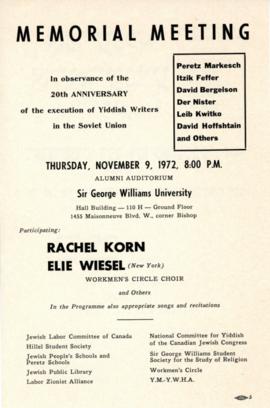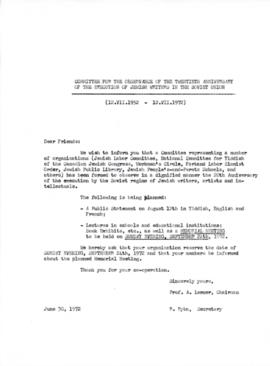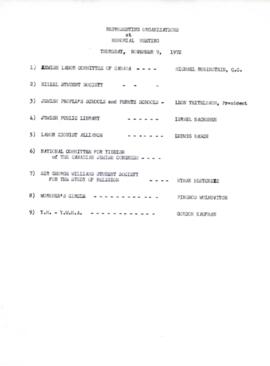Zone du titre et de la mention de responsabilité
Titre propre
Dénomination générale des documents
- Document textuel
Titre parallèle
Compléments du titre
Mentions de responsabilité du titre
Notes du titre
- Source du titre propre: Title based on the subject of the fonds.
Niveau de description
Cote
Zone de l'édition
Mention d'édition
Mentions de responsabilité relatives à l'édition
Zone des précisions relatives à la catégorie de documents
Mention d'échelle (cartographique)
Mention de projection (cartographique)
Mention des coordonnées (cartographiques)
Mention d'échelle (architecturale)
Juridiction responsable et dénomination (philatélique)
Zone des dates de production
Date(s)
-
1972 (Création/Production)
- Producteur
- Joint Committee for the Observance of the 20th Anniversary of the Execution of Yiddish Writers in the Soviet Union
-
1970 - 1972 (Création/Production)
- Producteur
- Jewish Labour Committee
Zone de description matérielle
Description matérielle
Contient 0.06m de documents textuels.
Zone de la collection
Titre propre de la collection
Titres parallèles de la collection
Compléments du titre de la collection
Mention de responsabilité relative à la collection
Numérotation à l'intérieur de la collection
Note sur la collection
Zone de la description archivistique
Nom du producteur
Histoire administrative
In 1934, leaders in the International Ladies’ Garment Workers’ Union, the Amalgamated Clothing Workers of America, the Workmen’s Circle, the Jewish Daily Forward Association, the Jewish Socialist Verband and others gathered in New York’s lower east side to form the Jewish Labor Committee. The formation of the Jewish Labor Committee was in response to the ever-growing threat of fascism in Europe. The group publicly campaigned to raise awareness of the plight of European Jewry, raised funds for partisan fighters, brought over thousands of political and cultural leaders – both Jews and non-Jews, and immediately after the war assisted in relief efforts and provided support in bringing over refugees.
Jewish Labour Committees both in the United States and Canada extended their wartime work in the 1950s by campaigning against discrimination among workers as well as human rights activism on a global scale. In Montreal, the Jewish Labour Committee actively participated in pressuring the government to adopt human rights legislation at the provincial level.
In 1947, the Canadian government selected two members of the JLC, Bernard Shane and Maurice Silcoff, to travel to Europe to select skilled immigrants as refugees. Both men were temporarily named colonels of the Canadian army so that they could travel more easily across war ravaged Europe. The task of bringing over skilled garment workers to Canada was no mean feat but the efforts had far reaching implications since workers were then able to bring over family members.
The Jewish Labor Committee of Canada Bulletin for 1975, on reporting the death of Bernard Shane, placed the number of families brought to Canada through the work of the JLC at over 2,000.
Nom du producteur
Histoire administrative
The Joint Committee for the Observance of the 20th Anniversary of the Execution of Yiddish Writers in the Soviet Union was formed in 1972 and represented a number of organizations: the Jewish Labor Committee, the National Committee for Yiddish of the Canadian Jewish Congress, Workmen's Circle, Farband Labor Zionist Order, Jewish Public Library, Jewish People's and Peretz Schools, and more, in order to observe the 20th anniversary of the execution by the Soviet regime of Jewish writers, artists, and intellectuals. The committee was chaired by Arthur Lermer. The meetings culminated in an even on November 9, 1972 featuring Rachel Korn, Eli Wiesel, Professor John Humphrey, Shulamis Yelin, Rebecca Augenfeld, Yehuda Elberg, the Workmen's Circle Choir, and others.
Historique de la conservation
Portée et contenu
Le fonds contient des documents concernant la réunion publique de commémoration du Comité ouvrier juif pour les écrivains soviétiques, qui marqua le 20ème anniversaire de l'exécution d'écrivains yiddish de l'Union soviétique et réunit Rachel Korn, Eli Wiesel, le Professeur John Humphrey, Shulamis Yelin, Rebecca Augenfeld, Yehuda Elberg, le choeur du Workmen's Circle, et d'autres participants. La réunion publique est représentée par des billets (et de la correspondance concernant les billets), des bulletins, des invitations, et des notes et de la correspondance administratives. Un certain nombre d'autres réunions publiques en 1972 menant au mémorial du 9 novembre et organisées par le Comité unitaire pour l'observation du 20ème anniversaire des écrivains yiddish de l'Union soviétique sont également représentées dans le fonds par des minutes, des agendas, et des invitations aux réunions publiques. Enfin, l'anniversaire du soulèvement du ghetto de Varsovie le 19 avril est également représenté dans le fonds sous la forme de plusieurs bulletins et d'agendas.
Zone des notes
État de conservation
Source immédiate d'acquisition
Classement
Langue des documents
- anglais
- yiddish
Écriture des documents
Localisation des originaux
Disponibilité d'autres formats
Restrictions d'accès
Délais d'utilisation, de reproduction et de publication
Instruments de recherche
Éléments associés
Accroissements
Identifiant(s) alternatif(s)
Numéro normalisé
Numéro normalisé
Mots-clés
Mots-clés - Sujets
Mots-clés - Lieux
Mots-clés - Noms
- Jewish Labour Committee (Sujet)
- Joint Committee for the Observance of the 20th Anniversary of the Execution of Yiddish Writers in the Soviet Union (Sujet)
- Jewish Public Library (Sujet)
- Worker's Circle of Montreal (Sujet)
- Farband (Sujet)
- Canadian Jewish Congress (Sujet)
- Jewish People's and Peretz Schools (Sujet)
- Wiesel, Elie, 1928-2016 (Sujet)
- Lermer, Arthur, 1908-2001 (Sujet)
- Korn, Rochl, 1898-1982 (Sujet)
- Feffer, Itzik, 1900-1952 (Sujet)
- Labour Zionist Alliance (Sujet)
- Federation CJA (Sujet)
Mots-clés - Genre
Zone du contrôle
Identifiant de la description du document
Identifiant du service d'archives
Règles ou conventions
Statut
Niveau de détail
Dates de production, de révision et de suppression
This description was created by Processing Archivist Kate Moore in January 2023.






